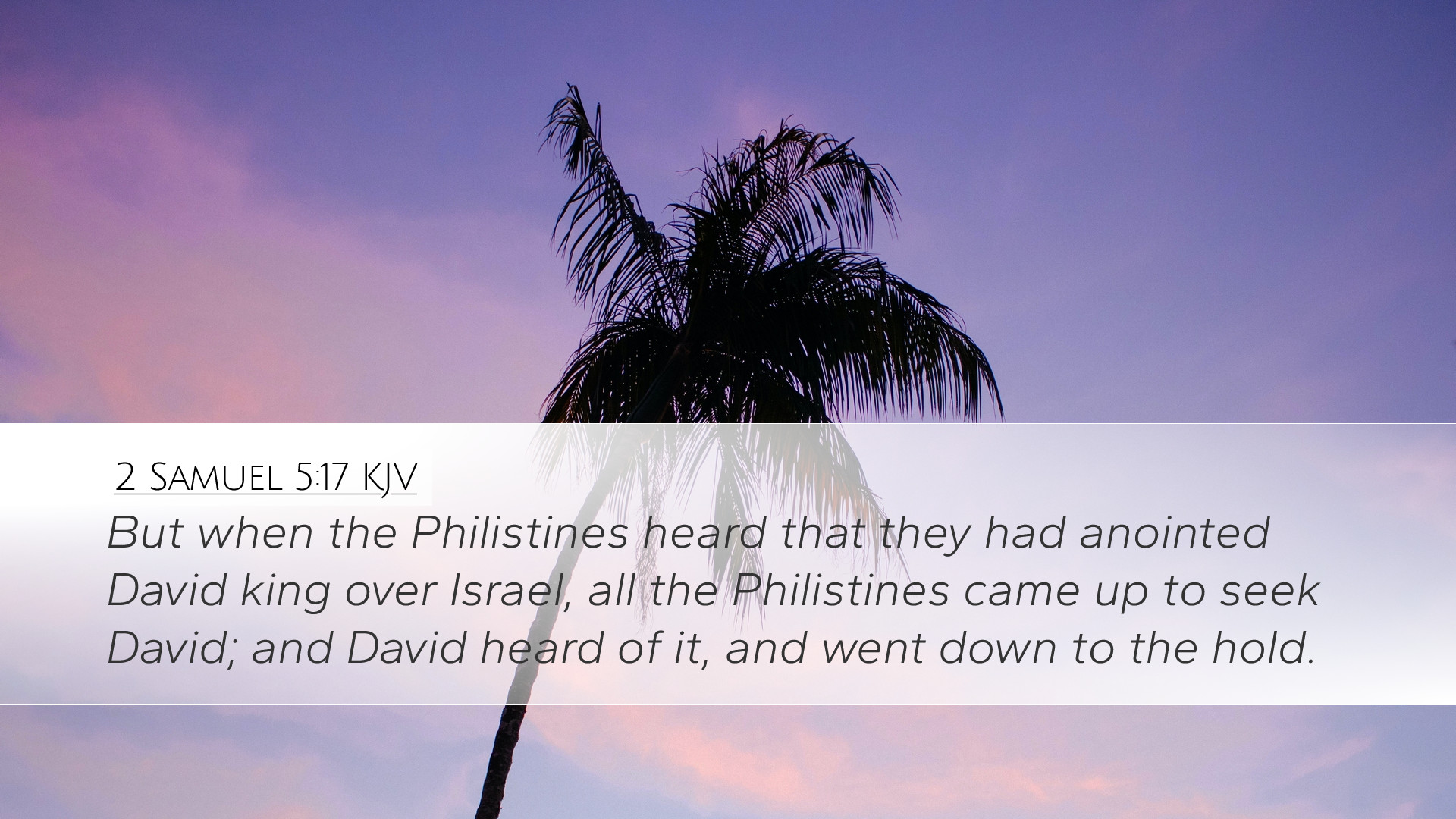Commentary on 2 Samuel 5:17
Verse Context: 2 Samuel 5:17 states, "When the Philistines heard that David was anointed king over Israel, all the Philistines went up to seek out David; and David heard of it, and went down to the stronghold."
Introduction
This passage marks a critical moment in the life of King David, as his anointing leads to immediate conflict with the Philistines, who represent a continual threat to Israelite sovereignty and peace. The verse is pivotal for understanding the dynamics of David's reign, his early challenges, and the prophetic fulfillment of God’s promise to establish him as king.
Commentary Insights
-
Historical Background
In the context of ancient Israel, the Philistines were one of the primary enemies during David's ascension to the throne. Their aggressive actions upon hearing of David's anointing signify their desire to disrupt any potential change in leadership and to eradicate the perceived instability amidst Israel.
-
The Response of the Philistines
Albert Barnes comments on the Philistines' actions, indicating that their “hearing” of David's anointing was a cause for alarm, thus they immediately sought to confront him. This encapsulates the idea that leadership often invites conflict, particularly against established enemies.
-
David's Response
David’s decision to retreat to a stronghold signifies wisdom. Matthew Henry points out that rather than confronting the enemy head-on without preparation, David chose to secure himself first. This act demonstrates not only prudence but also a strategic mindset necessary for a leader facing external threats.
-
The Theological Implication
Adam Clarke notes that the anointing of David signifies God’s divine choice and favor. This event illustrates the theme of divine election where God empowers leaders to fulfill His purpose. David's response to the Philistine threat can be viewed as a test of faith—seeking God’s guidance amidst adversity.
-
The Nature of Leadership
The immediate conflict serves as a lesson for current and aspiring leaders. Effective leadership is not merely about gaining power or authority but involves understanding the consequences of one's position. David’s ability to recognize danger and respond appropriately underlines important leadership qualities.
-
Symbolism of the Stronghold
The stronghold to which David retreated can symbolize spiritual fortitude. It is a concept explored by Henry, who relates it to God as the believer's stronghold. In the face of trials and tribulations, the faithful are reminded to find refuge in God, who is always their protector and strong tower.
-
Spiritual Warfare
This passage can also be interpreted within the framework of spiritual warfare. The Philistines represent the forces that oppose God’s chosen leaders and plans. David’s anointing draws the battle lines between the kingdom of God and its adversaries. So too must contemporary believers recognize the spiritual battles that accompany their calling.
Conclusion
2 Samuel 5:17 not only records a historical event in David's life but weaves a narrative rich with theological and practical implications. The passage encourages leaders today to rely on God’s strength, seek wisdom before action, and recognize the spiritual dimensions of their calling. The interplay of divine sovereignty and human response provides a profound reminder of God’s faithfulness amid trials.
Reflective Questions
- In what ways can we better prepare ourselves as leaders in the face of opposition?
- How does God's choice of leaders manifest in today's church context?
- What strongholds do we turn to when facing spiritual battles?
- How can this passage inform our understanding of God's sovereignty in leadership?


